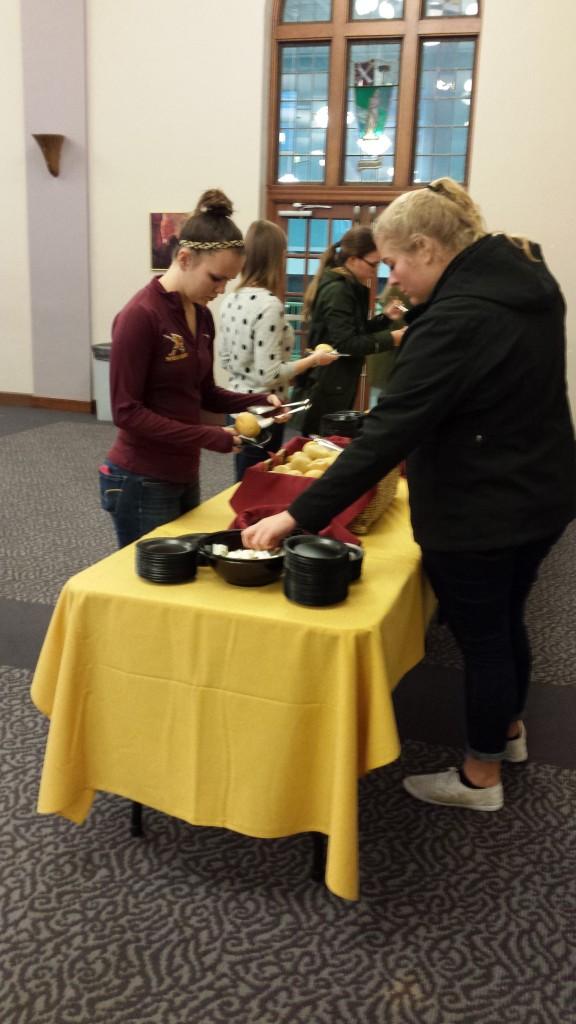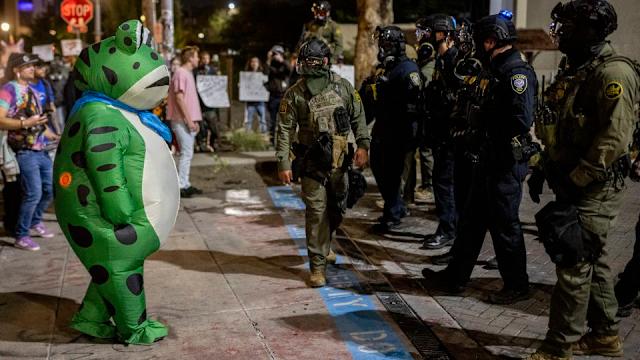Gannon University’s Center for Social Concerns and Ongoing Partnership with Everyone’s Neighbors, or OPEN, celebrated giving back as part of Thanksgiving by opening Hunger and Homlessness Awareness week with its Soup with Substance Event Monday.
Students were invited to share soup and conversation as part of a fish bowl discussion focused on youth homelessness. Unlike a panel discussion, the event featured a board of speakers and encouragement of audience questions rather than remarks.
Laura Goble, a panelist and director of the Center for Social Concerns, invited those present to eavesdrop on the conversation and send in questions electronically to the event’s Twitter page.
Other participants of the discussion were Lydia Archinal, a sophomore social work major; Tom Camillo, director of undergraduate admissions; Deacon Steve Washek, director of campus ministry; and Leah Johnson, a senior social work major.
Johnson began with the federal definition of a homeless person, which is someone who lacks fixed, adequate and reliable housing.
The panel discussed how this can happen to students or how students may fall into this definition without outwardly displaying the issue.
“The student has to identify themselves and take themselves out of the mix,” Camillo said of students without housing at Gannon.
“They don’t reveal themselves to us often.”
Washek said youth homelessness could come from any number of situations.
“We need to realize it’s not this person, but a family that’s homeless,” Washek said.
There are no youth shelters in Erie, so most homeless youth end up living with another family member or friend.
Johnson works with the homeless liaison for the city of Erie School District, Danny Jones, and they often encourage youth to live with someone they know. She said many kids awaiting placement in foster care end up waiting in less than desirable places under the state.
Goble, a trained foster parent, said kids are often to seek help from Child Youth Services because it makes their lives worse.
“The foster system stinks,” Goble said. “When you seek out services, you’re automatically put under a microscope.”
However, more volunteers are needed to give kids a foster home and they’re often afraid to step up, Goble said.
At colleges, Goble said the problem might not be as obvious because students will resort to living out of their cars if something happens to their housing arrangement.
“Most students live paycheck to paycheck,” Goble said. “It makes them very vulnerable.”
Camillo said the last thing Gannon wants to hear is news of a student without a home.
“It’s not part of our mission,” Camillo said.
Goble said she’s worked with students in such situations, and it helps to have a community present like Gannon.
“We work with people, not for people,” Goble said.
When students asked about helping people on the street in Erie, the consensus was to remember the person’s dignity.
Johnson said the best thing you can give is your time.
“I think if you feel safe, if you have the time, you should have a conversation with this person,” Johnson said.
Washek said sometimes you have to be careful about helping someone, because you might be doing more harm in the long run. It’s not always a good idea to give people money if they’re spending it on an addiction, he said.
Camillo said students should be encouraged to make these small steps toward change.
“I think it would be naïve to think we’ll change the entire world, but you can change one person’s life,” Camillo said.
Meredith Gursky, a senior social work major, said she attended the discussion because she’s been going since her freshman year.
“It’s a good time to pause and think about issues we don’t normally engage in,” Gursky said.
KELSEY GHERING








